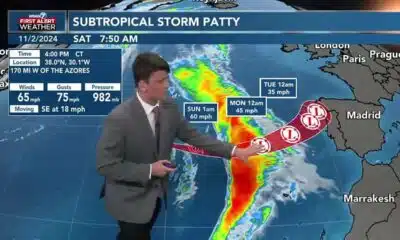Mississippi News
Alice Walker’s journals offer a ‘workbook’ for artists
Alice Walker’s journals offer a ‘workbook’ for artists

“Gathering Blossoms Under Fire: The Journals of Alice Walker” – the almost 500 page anthropology of diary entries by the acclaimed writer – starts with a poem inspired by Walker’s time living in Jackson.
“While love is dangerous / let us walk bareheaded / beside the Great River,” she writes in the poem’s second and final stanza. “Let us gather blossoms / under fire.”
The final lines are a metaphor for the impulse that moved a young Walker to join the civil rights movement in Mississippi in the summer of 1966; it also nods at her decision to leave about 10 years later. Walker wanted to prove to her family that it was possible for a Black woman to freely live in a place as dangerously racist as Jackson was at that time.
“That summer marked the beginning of the realization that I could never live happily in Africa–or anywhere else–until I could live freely in Mississippi,” Walker wrote.
But after several years of depression, loneliness and trauma – the result of watching civil rights activists face repeated abuse – Walker was burnt out, like a fire left unattended.
“I was starting to fray, my spirit was in tatters,” Walker told Mississippi Today. “It’s incredibly difficult to live in a place where people you care about deeply are being so abused – bombed, shot and banged, drowned, and assistanted and their houses blown up – it wears on you, and I felt all of that.”
“It wasn’t so much that I gave up on being there, it was that I simply wore out,” she added.
I couldn’t really endure.”
Walker’s journals, released earlier this year, document her development as a writer. The journals also show Walker coming to realize the kind of community she wanted to live in, one where creativity was not stifled by segregation. Walker and her editor, Valerie Boyd, who passed away earlier this year, hope can serve as a “workbook” – or put another way, as a form of therapy.
“I want the journals to be used so that people can see this working through of disappointment, anger, sorrow, regret,” Walker said in an interview with the New York Times. “So in that sense, it’s a medicine book.”
The first section – titled “Movement, Marriage and Mississippi” – records Walker’s time in Jackson in the 1960s while she was partners with Melvyn Leventhal, a Jewish lawyer for the NAACP, in the first legal interracial marriage in Mississippi. Many of the entries were written in the large backyard of a house in north Jackson and show Walker working through states-of-mind that will be familiar to any artist. – confidence, self-consciousness, and ambition.
“How odd it is – I am having trouble writing honestly or well,” Walker writes at one point. “Could it be because I dared mention to Mel that I might one day publish this journal?”
The section begins in 1965 with the 32nd anniversary of Walker’s parents – a time, she remarks, “that seems so long to live with someone and still enjoy being with them occasionally.”
In the next entry, Walker is on an airplane, flying south from New York to Atlanta for an orientation for student members of the Southern Christian Leadership Conference. It’s the first time Walker – who grew up in rural Georgia, the eighth child of sharecroppers and valedictorian of her segregated high school – returned South since she left to attend Sarah Lawrence College.
The time away was fortifying. She mocks the whiteness of the clouds – one looks like a king, “whiter among his subjects and with pigs’ ears and a snout.” She’s less disgusted by the syrupy accents of the white flight attendants. Then she’s on the ground, on a bus driving past Morris Brown College, a historically Black liberal arts college, to meet fellow foot-soldiers, whose solidarity imbues her journal entries with a sense of community.
Throughout the first section, before Walker marries her husband in Mississippi in 1967, she talks about dating men who fall into archetypes – the ones who want to date their mothers or think it’s bourgeois to want to be a writer. She also contemplates creating her own philosophy – “not Philosophy of the Absurd, etc, but a Philosophy based on Curiosity.”
Walker later does this, coining the term “womanist” to describe what it means to be a feminist of color.
In Jackson, Walker is initially “afraid” to say she likes it, but she admires the people who “are mainly doing what they want or what they feel has to be done.” Isolated in her house with her dog, unable to freely go to the grocery store with her husband, Walker starts to have nightmares in which she tells her family about “the beauty of Mississippi Negro Bravery” but is then arrested outside a gas station.
“How odd, after so much travel, to land in Mississippi,” she writes. “Definitely not the route Wright and Baldwin took. Mel would like to stay here a long time. So would I if only we could get away two or three times a year. Soon we will have been here a year and a half. I begin to feel like a colonizer.”
She teaches at Tougaloo College and Jackson State University and, as she gains more acclaim, she knows people wonder why she stays in Mississippi. Her husband wants to stay, though, so she oscillates between familial and personal responsibility. She feels like she should live in Mississippi because of the political premise of it: “Imagine being afraid of being in your own country!” She writes. “Simply to live anywhere with freedom requires a willingness to become an immovable force, except by death.”
An incident, not described in the journal, brings clarity born out of anger.
“I looked at the back of the cracker bus-driver’s head and I hated him and everybody that looks like him,” she writes. “I am not going to stay here much longer – and all the placating, explaining, courageous talk in the world is not going to make me stay here and be destroyed.”
Once she leaves Mississippi, it lingers. Walker has lived in northern California, but her first stop after she left was Brooklyn. She gets a divorce and lives with her daughter. She notes that Brooklyn is “remarkably” similar to Mississippi, but she’s decided that ideology does not always equate to endurance.
“We must go wherever we are not destroyed in the image of those who hate us,” she writes. “Home is wherever we can live human lives.”
Walker is a featured panelist at the Mississippi Book Festival on Aug. 20.
This article first appeared on Mississippi Today and is republished here under a Creative Commons license.
Mississippi News
Events happening this weekend in Mississippi: August 22-24
SUMMARY: This weekend (August 22-24) in Mississippi offers diverse events across Central Mississippi and the Pine Belt. In Jackson, enjoy concerts like Starlito x Don Trip and The Step Brothers 4 Life Tour. Art lovers can explore exhibits such as The Garden of Earthly Delights in Natchez and Hurricane Katrina: Mississippi Remembers in Jackson. Family-friendly activities include the Mississippi Children’s Museum exhibits and the Farmer’s Markets in Jackson, Natchez, and Vicksburg. Notable events include the Black Men’s Health Equity Conference, The Boss T.E.A. Party, and the 15th Annual Leadership Natchez Kickball Tournament. In the Pine Belt, Southern Miss hosts the SMAC Welcome Back Festival and Pride Preview, while Laurel features The Color Purple musical and a chess social.
The post Events happening this weekend in Mississippi: August 22-24 appeared first on www.wjtv.com
Mississippi News
Gymnast who sparked FBI sex abuse inquiry into coach tells AP she’s proud to come forward
SUMMARY: Finley Weldon, 18, bravely spoke out about abuse by her former gymnastics coach Sean Gardner, recently arrested on child sexual exploitation charges. Gardner, who worked at the renowned Chow’s Gymnastics Academy, allegedly targeted young gymnasts since 2004. Weldon endured manipulative and abusive behavior starting at age 11 but persevered to join Iowa State’s gymnastics team. Though many teammates quit due to Gardner, Weldon emphasizes breaking the cycle by coming forward. Investigations by SafeSport, local police, and the FBI uncovered hidden-camera evidence. Despite a slow legal process, Weldon hopes her courage helps protect future young athletes from similar abuse.
The post Gymnast who sparked FBI sex abuse inquiry into coach tells AP she’s proud to come forward appeared first on www.wjtv.com
Mississippi News
Zelenskyy, Trump express hope for talks with Putin to end war
SUMMARY: Ukrainian President Volodymyr Zelenskyy and U.S. President Donald Trump met with European leaders at the White House to discuss potential three-party peace talks with Russian President Vladimir Putin to end the war in Ukraine. Trump expressed support for NATO-like security guarantees for Ukraine but stopped short of committing U.S. troops. Zelenskyy showed openness to talks, emphasizing the need for lasting peace and a strong Ukrainian army. European leaders seek durable security assurances and pressure on Russia to cease fighting. Discussions followed Trump’s recent meeting with Putin, who reportedly demands control of the entire Donbas, a condition Zelenskyy rejects as unconstitutional.
The post Zelenskyy, Trump express hope for talks with Putin to end war appeared first on www.wjtv.com
-
News from the South - Florida News Feed6 days ago
Floridians lose tens of millions to romance scams
-
News from the South - Texas News Feed6 days ago
New Texas laws go into effect as school year starts
-
News from the South - Kentucky News Feed7 days ago
AmeriCorps is under siege. What happens in the communities it serves?
-
News from the South - Alabama News Feed6 days ago
Final steel girders placed on new Gulf Shores bridge, completion on track
-
News from the South - West Virginia News Feed6 days ago
Religious exemption debate front and center amid new school year in WV
-
News from the South - Arkansas News Feed5 days ago
Trump, Zelenskyy exit White House talks hopeful about security guarantee for Ukraine
-
News from the South - Alabama News Feed6 days ago
Despite federal shift, state health officials encourage COVID vaccines for pregnant women
-
News from the South - Tennessee News Feed6 days ago
Son hopes to get emergency visa following mother's death in East Tennessee






















































